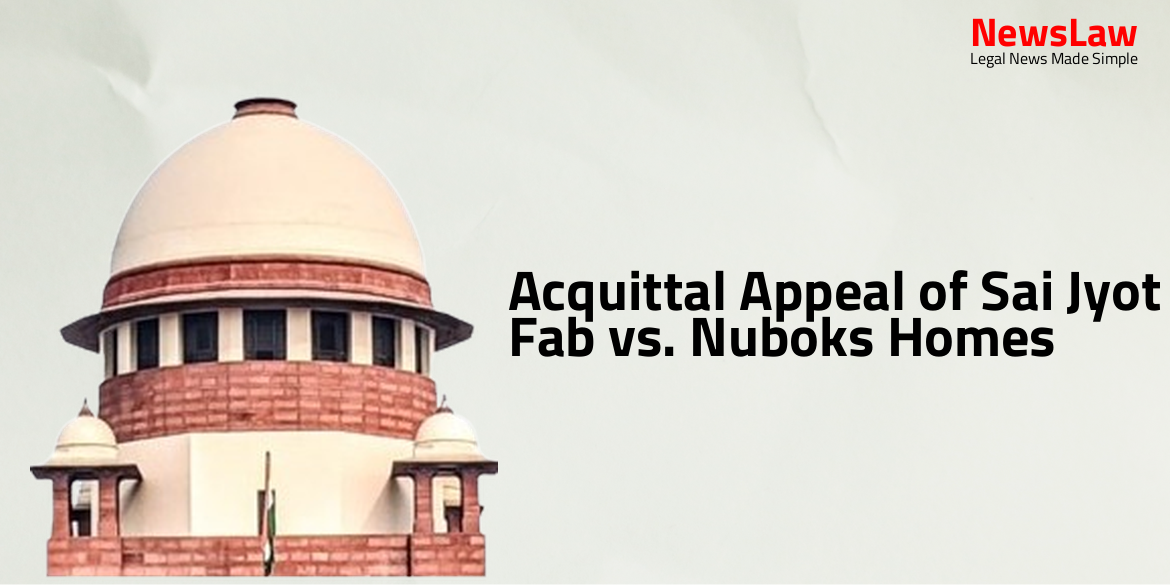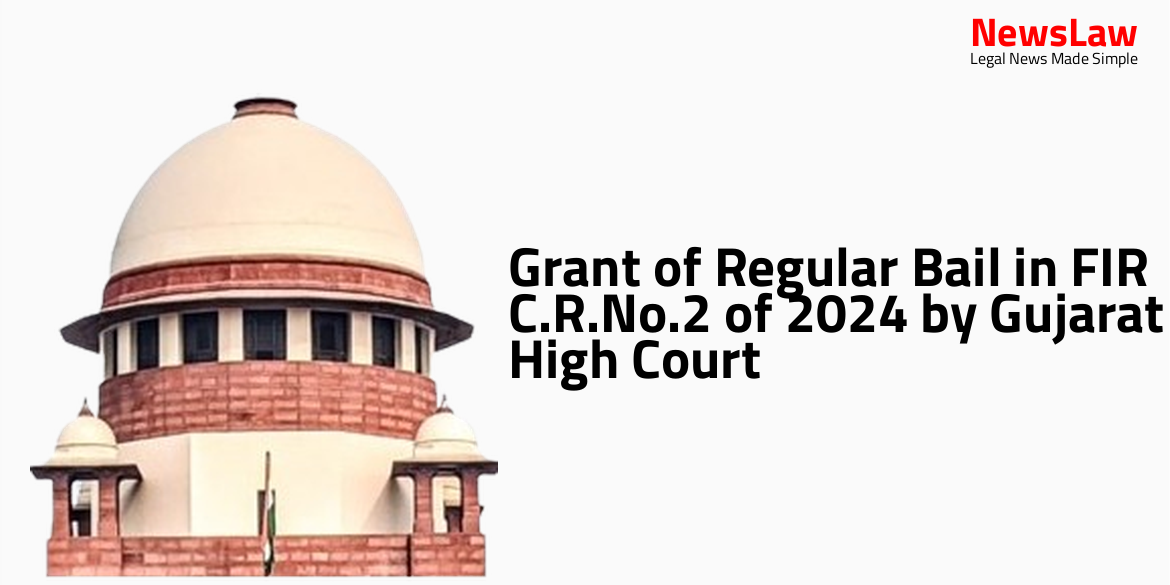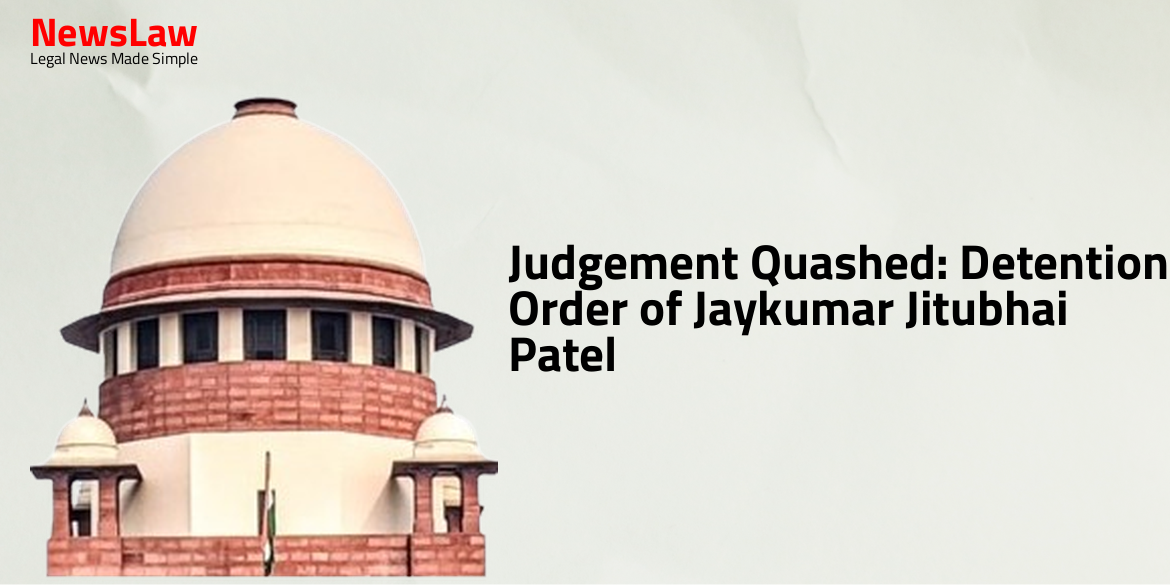Exploring the intricacies of the legal battle between Sai Jyot Fab and Nuboks Homes, the Gujarat High Court’s recent judgement on the acquittal appeal sheds light on key aspects of burden of proof and evidentiary requirements. Dive into the details of the case where the respondent raised doubts and successfully shifted the burden back to the complainant. Stay informed about the nuances of this legal dispute and its implications in the realm of business partnerships and financial transactions.
Facts
- The complainant, proprietor of Sai Jyot Fab and Bharati Fashion, knew the accused as they belonged to the same community.
- The accused withdrew Rs.80,00,000 from the brother’s account through Deepsha with assurance of preparing a partnership deed.
- Three cheques issued for repayment of Rs.4,00,000, Rs.6,00,000, and Rs.6,00,000 returned with ‘funds insufficient’ and ‘payment stopped by drawer’ endorsements.
- Private complaint filed before the competent court after due procedure.
- Cheques of Rs.50,000 each transferred to Akash Textile, and Rs.2,00,000 cash given to complainant in the year 2017.
- Complainant offered partnership in Nuboks Homes of the accused, transferring amounts through NEFT transactions.
- Summons issued under section 204 of the Cr.P.C. after accused pleaded not guilty.
- Complainant gave Rs.9,00,000 in three parts of Rs.3,00,000 each to the accused’s father, Rajendra Sehejwani.
- Maternal uncle of the accused joined as a partner without the complainant’s consent, leading to objections.
Arguments
- Learned advocate Mr. Kinariwala submits that respondent-accused failed to rebut the presumption in favor of the complainant regarding the signature on the cheque.
- The trial court shifted the onus on the complainant to prove the case beyond reasonable doubt, which is contested by Mr. Kinariwala.
- Judgment of acquittal was based on the grounds of lack of documentary evidence and filing of a single complaint despite two different firms cheques being returned.
- The complainant’s failure to provide documentary evidence regarding the proprietor of Bharti Fashion was highlighted as a key reason for the acquittal.
- Learned advocate Mr. Kinariwala argued that the proprietor of Bharti Fashion is the complainant’s father.
- The complainant is an authorized signatory at Bharti Fashion.
- The trial court acquitted the respondent-accused without considering these aspects.
- Mr. Kinariwala emphasized that the judgement of acquittal lacks cogent reasons.
- He requested leave to be granted and the appeal to be admitted.
Analysis
- The complainant did not produce any evidence to show his status as proprietor, power of attorney holder, or authorized signatory.
- The burden of proof has two meanings: burden of proof as a matter of law and pleadings, and burden of establishing a case.
- The burden of proof as a matter of law remains fixed based on pleadings throughout the trial.
- As the accused successfully raised doubts through evidence or circumstances, the burden shifted back to the complainant to prove the case beyond reasonable doubt.
- Evidence required to shift the burden can be direct, circumstantial, or based on legal presumptions.
- Initially, the burden rests on the plaintiff to prove execution of the promissory note by the defendant.
- Once the promissory note’s execution is proven, the presumption under Section 118 of the NI Act allows shifting the burden to the other party.
- The record showed that the complainant admitted during cross-examination that he was not the proprietor and had no specific powers related to Bharti Fashion.
- Principles of natural justice were breached in the case of Milind Shripad Chandurkar vs Kalim M.Khan & Anr.
- The respondent was not given a fair opportunity to present his case.
- No formal notice was issued to the respondent about the proceeding against him.
- In cases involving the Negotiable Instruments Act, the burden of proof is on the plaintiff to establish the execution of the instrument.
- Section 118 of the NI Act mandates the court to raise a presumption in favor of the existence of consideration once execution is proven.
- The defendant can rebut this presumption through direct or circumstantial evidence.
- The presumption under sections 118 and 139 of the NI Act is rebuttable.
- A probable defense raised by the defendant, supported by evidence, can rebut the presumption of consideration.
- The accused successfully raised a probable defense in this case, which was supported by evidence presented by the complainant.
Decision
- The application for seeking leave to prefer an appeal has been declined.
- The registration of the Criminal Appeal has been refused due to the dismissal of the Criminal Misc. Application.
- The application is disposed of and the appeal is not registered.
Case Title: KAMLESH SUNDARDAS HEMNANI Vs. STATE OF GUJARAT
Case Number: R/CR.MA/17303/2023



